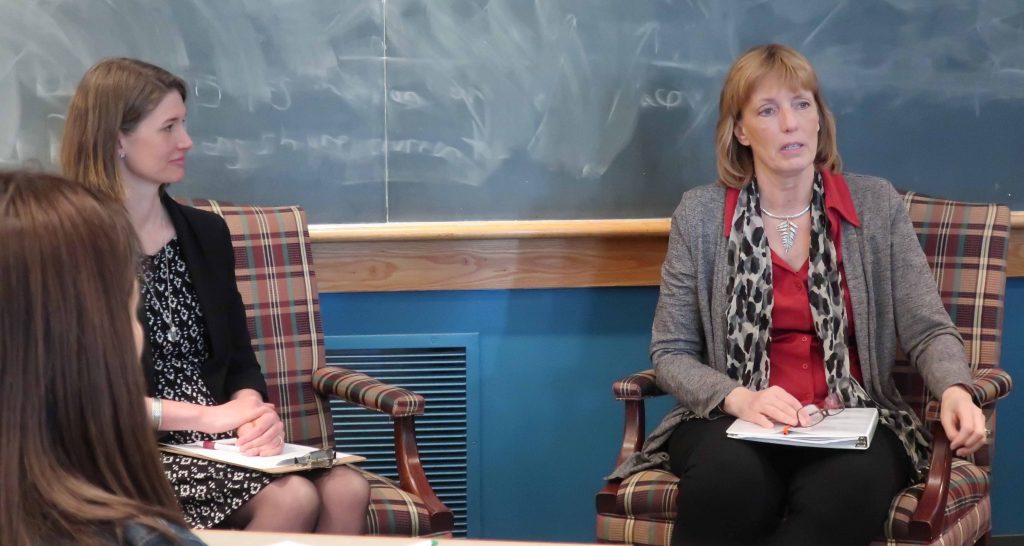By Katie Neitz
Secretary Cindy Dunn, who leads Pennsylvania’s Department of Conservation and Natural Resources, let Lafayette’s environmental sciences and studies students and faculty know that they have an ally in Harrisburg.
Dunn, who is known for her conservation leadership, spoke at the College in April. She first addressed a large audience in Hugel Science Center, including President Alison Byerly, Board of Trustees Chair Bob Sell ’84, and Board Member Alan Griffith ’64, who was instrumental in bringing Dunn to campus. Dunn then visited a class, taught by Andrea Armstrong, assistant professor of environmental science and studies.

Andrea Armstrong, assistant professor of environmental science and studies, invited DCNR Secretary Cindy Dunn to speak to her Environmental Policy course.
During her visit, Dunn shared insights about her personal career path and commitment to the environment as well as insights about state policies, including her most recent effort to plant 10 million trees across the Commonwealth.
Dunn also praised the College for its efforts to take environmental action on campus. In February, the Board of Trustees unanimously approved the College’s Climate Action Plan 2.0, which outlines steps the College will take to achieve carbon neutrality by 2035.
“Conservation is the business of the future, and we need citizens demanding action,” Dunn said. “I try to spend time every year in front of college students. I think young people are the answer. If you look at polling data, young people really get it and have a commitment to the environment. As young people take on more seats in government and other positions of authority, I think progress will happen faster.”
In Armstrong’s Environmental Policy course, Dunn actively engaged with students, asking them to share their feedback and perspectives. Specifically, Dunn was curious if smartphones are critical to students when they are visiting state parks; she also inquired how students educate people around them who aren’t supportive of environmental policies.
“I thought that the event was a unique opportunity to meet the person behind one of the policies that we discussed in class,” Armstrong says. “Many of my students reported that ‘it’s one thing to read about things in class, and it is another to hear it from the person who is putting that policy into action.’”
Emma Stierhoff ’19 is one such student.
“Secretary Dunn’s visit gave me a lot of hope for climate policy,” says Stierhoff, a biology major and environmental studies minor who is active in Lafayette’s sustainability efforts. “It was clear that she genuinely cared about conservation and enacting policy that would benefit Pennsylvania citizens. Politics can often be very disheartening from an environmentalist perspective. Very few people unconditionally support conservation and environmental policy without some hidden agenda, so it was very refreshing to see a policymaker who was truly devoted to addressing environmental issues. I appreciated how receptive she was to our opinions and feedback as well.”
